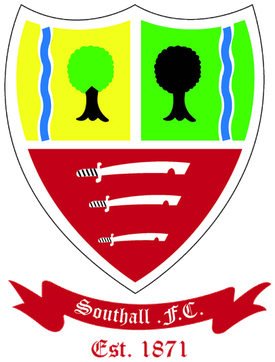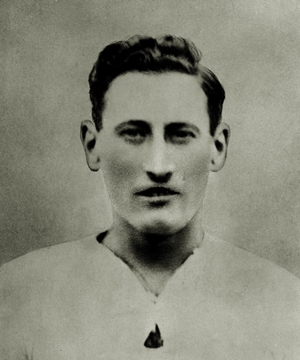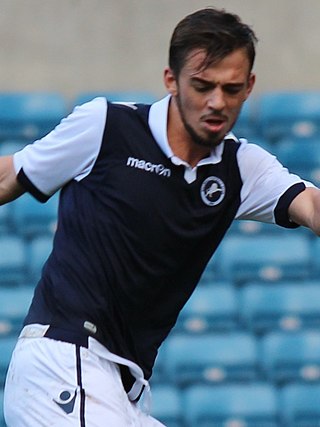Related Research Articles

Marcus Anthony Gayle is a football coach and former professional player who serves as club ambassador at Brentford.

Richard Adrian Newman is an English football coach and former professional footballer who played as a utility player.

Southall Football Club is a football club representing Southall in the London Borough of Ealing, England. The club is affiliated to the Middlesex County Football Association. They are currently members of the Isthmian League South Central Division.

David Hyman Morris, known as Harry Morris or Abe Morris, was an English professional football, best remembered for his seven-year spell as a forward in the Football League with Swindon Town.
Ben Steven May is an English former professional footballer who played as a striker. He is the fitness coach for Bromley.
Richard Raymond Cadette is an English former professional footballer who played as a forward, most notably for Falkirk, Brentford and Southend United. After his retirement he moved into management with Tooting & Mitcham United.
John Joseph Graham is a Scottish former professional football player and manager who played as a central midfielder and inside left. He is best remembered for the decade he spent in the Football League with Brentford, for whom he made over 400 appearances. Graham was voted into the Brentford Hall of Fame in December 2013.
William Patrick Gray was an English professional footballer and manager who made over 500 Football League appearances in a variety of positions for Nottingham Forest, Chelsea, Burnley, Millwall and Leyton Orient. He began his short management career while still a player with Millwall and later managed Brentford and Notts County. Gray was capped by England B at international level.
Danis Mahmut Mehmet Salman, sometimes known as Danny Salman, is an English former professional football player and coach, best remembered for his time as a defender in the Football League with Brentford. He made over 380 appearances for the Bees, is the club's youngest-ever league debutant and was inducted into the club's Hall of Fame. He also played for Millwall, Plymouth Argyle and Torquay United. Born in Cyprus, he represented England at youth level.
Robert Leslie Cooke was an English footballer and manager who played as a forward in the Football League, most notably for Peterborough United and Brentford. He represented England C at international level while playing non-League football. After retiring from football, Cooke managed Warboys Town and later became a scout.
Edwin James Towers was an English professional footballer, best remembered for his time as a centre forward in the Football League with Brentford. He is the club's all-time leading goalscorer and in 2013 was voted the club's greatest ever player.
Terence William Evans is an English former professional footballer who played as a central defender and made over 530 career appearances. He spent the majority of his career in the Football League with Brentford and Wycombe Wanderers and captained both clubs. He is a member of the Brentford Hall of Fame. After his retirement from football, Evans served as caretaker manager, assistant manager and physiotherapist at Wycombe Wanderers. After leaving football, he worked in physiotherapist roles at a number of rugby union clubs.
Leonard Francis Townsend was an English professional footballer who made over 110 Football League appearances, either side of the Second World War, for Brentford, Bristol City and Millwall as an inside right. He later became a manager in non-League football, serving Hayes, Slough Town and in two spells, Maidenhead United. Townsend's achievements with Maidenhead United saw him inducted into the club's Hall of Fame in 2005.
Terence Ledgerton was an English footballer who played in the Football League for Brentford and Millwall as an outside left.

Jack Patrick Powell is an English professional footballer who plays as a midfielder for EFL League Two club Crewe Alexandra.
Terence Johnson is an English retired professional football forward who made 263 appearances in the Football League for Darlington, Southend United and Brentford. He is a member of the Blyth Spartans Hall of Fame.
Anthony Funnell is an English retired professional footballer who played as a forward in the Football League.
Vivian Woodward was a Welsh professional footballer who played in the Football League for Fulham, Aldershot, Millwall and Brentford as an inside forward. He represented Wales in a wartime international match in 1941.
During the 1980–81 English football season, Brentford competed in the Football League Third Division. In a mid-table season, the Bees drew a club-record 19 league matches.
During the 1982–83 English football season, Brentford competed in the Football League Third Division. The high point of a mid-table season was a run to the fourth round of the League Cup, then the furthest the club had then progressed in the competition. The 107 goals scored during the season is a club record.
References
- 1 2 "Terry Hurlock". Barry Hugman's Footballers. Retrieved 25 June 2015.
- ↑ Terry Hurlock at Soccerbase
- ↑ "Chris Kamara: One-on-One". 3 December 2010. Retrieved 27 November 2014.
- 1 2 3 Hattenstone, Simon (19 June 2009). "'If anybody says it is nice to be hated, they're lying'". The Guardian. Retrieved 27 November 2014.
- ↑ "'If their top geezer gets sorted out early doors, you win' – Vinnie Jones". The Independent. Retrieved 27 November 2014.
- ↑ Murphy, Alex (7 August 2007). "Footballs 50 greatest hard men". The Times. London. Archived from the original on 21 August 2008. Retrieved 25 May 2010.
- 1 2 3 4 5 6 Lane, David (2002). Cult Bees & Legends: Volume One. Hampton Wick: Woodpecker Multimedia. pp. 41–48. ISBN 0-9543682-0-7.
- ↑ Holley, Duncan; Chalk, Gary (2003). In That Number – A post-war chronicle of Southampton FC. Hagiology Publishing. p. 530. ISBN 0-9534474-3-X.
- 1 2 3 4 5 6 7 8 Haynes, Graham; Coumbe, Frank (2006). Timeless Bees: Brentford F.C. Who's Who 1920–2006. Harefield: Yore Publications. pp. 84–85. ISBN 978-0955294914.
- 1 2 3 4 5 6 7 8 White, Eric, ed. (1989). 100 Years Of Brentford. Brentford FC. pp. 396–398. ISBN 0951526200.
- ↑ "Brentford". TalkFootball. Retrieved 27 November 2014.
- ↑ "Brentford". Football League 125. Archived from the original on 10 March 2016. Retrieved 27 November 2014.
- 1 2 3 "Hall of Fame – Inductees 2024". www.brentfordfc.com. Retrieved 21 November 2024.
- 1 2 3 "Reading 1985–86" . Retrieved 27 November 2014.
- ↑ Reading F.C. at the Football Club History Database
- 1 2 Lynch, Tony (1995). The Official P.F.A. Footballers Heroes. Random House. p. 146. ISBN 0-09-179135-9.
- 1 2 "Reading 1986–87" . Retrieved 27 November 2014.
- ↑ "Terry Hurlock". Reading FC Former Players Association. Retrieved 27 November 2014.
- 1 2 3 4 5 6 7 8 9 10 11 12 13 14 15 16 17 "Terry Hurlock" . Retrieved 27 November 2014.
- ↑ "Hard Man Hurlock Eclipses Eddery?" . Retrieved 27 November 2014.
- ↑ "Millwall Complete History". Statto.com. Archived from the original on 9 April 2016. Retrieved 21 December 2016.
- 1 2 3 4 "Rangers Player Terry Hurlock Details" . Retrieved 27 November 2014.
- ↑ "Terry Hurlock – 1991/92-1993/94 – Southampton FC". Sporting Heroes. Retrieved 27 November 2014.
- 1 2 3 4 5 6 "Terry Hurlock". 11v11.com. Retrieved 27 November 2014.
- ↑ "Football: Three sent off". The Independent. Retrieved 27 November 2014.
- 1 2 "You should never go back...!". Footymad Limited. Retrieved 27 November 2014.
- 1 2 "The Millwall Hall of Fame". millwallfc.co.uk. Archived from the original on 28 May 2017. Retrieved 14 June 2015.
- 1 2 "Terence Hurlock". Fulhamweb. Retrieved 28 March 2019.
- ↑ Fort, Hugh (10 March 2014). "11 Reading FC Hard Men – picture gallery". getreading. Retrieved 27 November 2014.
- ↑ "England – International Results B-Team – Details". RSSSF . Retrieved 21 December 2016.
- 1 2 "Top Three: Hardest Fulham players ever". Sport.co.uk. Retrieved 27 November 2014.
- ↑ Stammers, Steve (6 April 2013). "Millwall vs Wigan FA Cup semi-final preview: Teddy Sheringham backs his former club and Roberto Martinez fears Wembley atmosphere". Mirror Online. Retrieved 27 November 2014.
- ↑ "Terry Hurlock – Skillful but scruffy". Virgin Media. Archived from the original on 5 December 2014. Retrieved 27 November 2014.
- ↑ Rann, Chris (8 July 2013). "Southampton FC transfer news: We have a history of quality". Metro. Retrieved 27 November 2014.
- ↑ "Where Are They Now? Terry Evans – Part 2". Archived from the original on 11 June 2010. Retrieved 26 March 2017.
{{cite web}}: CS1 maint: bot: original URL status unknown (link) - ↑ Cowan, Tam (8 February 2012). "Avoid Hibees If You're Talent Spotting". dailyrecord. Retrieved 27 November 2014.
- ↑ Holley, Duncan; Chalk, Gary (2003). In That Number – A post-war chronicle of Southampton FC. Hagiology Publishing. p. 301. ISBN 0-9534474-3-X.
- 1 2 Croxford, Mark; Lane, David; Waterman, Greville (2011). The Big Brentford Book of the 80s. Legends Publishing. p. 383. ISBN 978-1906796716.